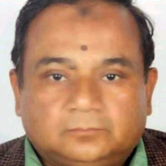
Shamimul Qamar
Work place: Computer Science & Engineering Department, College of Sciences & Arts, Dhahran Al Janoub Campus, King Khalid University, Abha 64261, Kingdom of Saudi Arabia, KSA
E-mail: sqamar@kku.edu.sa
Website:
Research Interests: Massive open online courses, Technology integration into the evaluation
Biography
Shamimul Qamar has done his B.Tech from MMMEC Gorakhpur, M.Tech from AMU, Aligarh and earned his Ph.D. degree from IIT Roorkee. Prof. Qamar has a wide teaching experience in various Engineering colleges. He has research interests in Communication & Computer network, Computer Networks, Multimedia applications, Internet applications, Satellite network, DSP and Image Processing. He has published several research papers in reputed national/international Journals and conference. He served as a Consultant in Jackson State University, the USA. He has written some text books and chapters in the field of Electronics & Computer Engineering. He is also a technical programme committee member in the International Mobility Conference, Singapore. He is a life member of International Association of Engineers and a life member of Indian Society of Technical Educational. His technical endeavours helped to set up a research lab according to latest technical innovations. He has actively participated in various technical courses workshops, seminar etc. at the IITs.
Author Articles
Reinforcement Learning Based Efficient Power Control and Spectrum Utilization for D2D Communication in 5G Network
By Chellarao Chowdary Mallipudi Saurabh Chandra Prateek Prateek Rajeev Arya Akhtar Husain Shamimul Qamar
DOI: https://doi.org/10.5815/ijcnis.2023.04.02, Pub. Date: 8 Aug. 2023
There are billions of inter-connected devices by the help of Internet-of-Things (IoT) that have been used in a number of applications such as for wearable devices, e-healthcare, agriculture, transportation, etc. Interconnection of devices establishes a direct link and easily shares the information by utilizing the spectrum of cellular users to enhance the spectral efficiency with low power consumption in an underlaid Device-to-Device (D2D) communication. Due to reuse of the spectrum of cellular devices by D2D users causes severe interference between them which may impact on the network performance. Therefore, we proposed a Q-Learning based low power selection scheme with the help of multi-agent reinforcement learning to detract the interference that helps to increase the capacity of the D2D network. For the maximization of capacity, the updated reward function has been reformulated with the help of a stochastic policy environment. With the help of a stochastic approach, we figure out the proposed optimal low power consumption techniques which ensures the quality of service (QoS) standards of the cellular devices and D2D users for D2D communication in 5G Networks and increase the utilization of resources. Numerical results confirm that the proposed scheme improves the spectral efficiency and sum rate as compared to Q-Learning approach by 14% and 12.65%.
[...] Read more.Other Articles
Subscribe to receive issue release notifications and newsletters from MECS Press journals